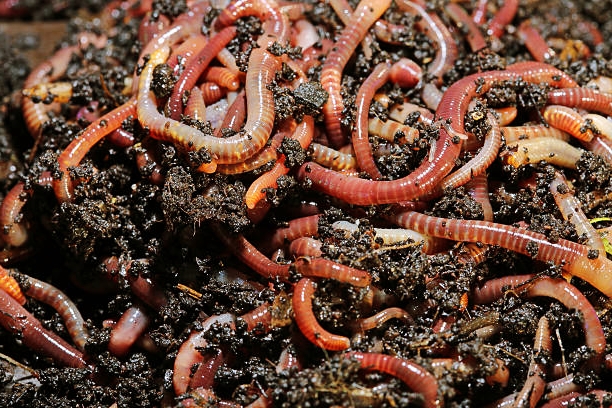How earthworms can reverse the effects of chemicals in fertile soil?
Earthworms are small yet mighty creatures with the ability to transform soil and enhance its fertility. They have been credited with numerous benefits for the environment, including the ability to reverse the effects of chemicals in fertile soil. By burrowing through the soil and consuming organic matter, earthworms help to improve the soil structure, aeration, and water retention. Further, they help to break down toxins and pollutants that have been added to the soil, eliminating their effects and helping to create healthy, productive soil. In this blog, we explore the role of earthworms in reversing the effects of chemicals in fertile soil and the overall environmental impact of these incredible creatures.
Table of Contents
Overview of Earthworms
Earthworms are small, segmented creatures that live in soil and are important for creating and maintaining healthy soil environments. They are important decomposers that help break down organic matter and recycle nutrients, making them a key part of the terrestrial and aquatic food webs. Earthworms can also stimulate soil aeration, improving the water and air flow between soil particles.

Earthworms have a wide distribution, occupying a variety of habitats ranging from tropical to temperate and even polar regions. They come in a wide variety of sizes and colours, and some species can grow up to 3 feet long. Earthworms play an important role in maintaining soil fertility and structure, helping to improve soil health and overall plant productivity.
Benefits of Earthworms in Fertile Soil
Earthworms are essential to achieving and maintaining fertile soil. Earthworms are responsible for the aeration of the soil, and they also help to break down organic material and mix it into the soil. Through their burrowing and tunnelling activities, they create a network of tiny tunnels which allow air and water to penetrate deeper into the soil. This promotes root growth, as well as the growth of beneficial bacteria, fungi, and other organisms. Earthworms also break down and mix in organic matter, such as dead leaves and animal manure, which adds essential nutrients to the soil. Ultimately, this leads to healthier, more productive soil.
Earthworms’ Ability to Reverse Chemical Effects
Earthworms are known for their ability to reverse the negative effects of chemicals in the environment. These small creatures have an amazing capacity to break down and biodegrade pollutants that may have otherwise caused lasting damage. They can take pollutants from the surface of the soil and transform them into harmless chemicals that can be recycled and used again. This beneficial process helps to keep our environment healthy and safe. Earthworms are an important part of the earth’s natural cycle, and their ability to reverse the effects of chemicals can be a powerful asset in preserving our planet.
Examples of Earthworms Reversing Chemical Effects
Earthworms are an important component of many ecosystems. They are known for their ability to aerate and enrich soils, but they can also have a positive effect on the chemical composition of soils. Studies have demonstrated that earthworms can help reduce the levels of heavy metals and other chemical pollutants in soils. This is done by their ability to ingest, transform, and excrete pollutants, as well as by the production of mucus which binds to toxins and helps to keep them out of the environment.
Earthworms can also help to neutralize the effects of acid rain and have been found to reduce acidity levels in soils. Additionally, earthworms are known to be able to reverse the effects of eutrophication, reducing the levels of nutrients in soils that lead to algal blooms and other water-related problems. The contributions of earthworms to the health of our environment should not be underestimated.
Environmental Impact of Earthworms
Earthworms are a vital part of our terrestrial ecosystems, playing several key roles in soil health and fertility. They aerate soils, improve drainage, increase water infiltration and nutrient availability, and are important food sources for many organisms. Despite the benefits they provide, however, earthworms can have an impact on the environment. Earthworms can reduce biodiversity, alter soil structure, and even contribute to soil erosion. It is important to understand the effects of earthworms on the environment to properly manage their populations and ensure they remain a positive force in our ecosystems.
The Role of Earthworms in Soil Health
Earthworms are one of the most important organisms in the soil, playing a critical role in soil health. Earthworms facilitate the breakdown of organic matter and increase the availability of nutrients for plants. They help aerate the soil, improve water infiltration and retention, reduce erosion, and increase soil fertility. Earthworms also act as decomposers, consuming organic material and releasing nutrients essential for plant growth.
They form channels that allow oxygen and water to penetrate deeper into the soil and can act as food sources for other organisms. Earthworms are also important indicators of soil health, as their presence or absence can give clues to the type of soil environment, its fertility, and its ability to support plant growth. For these reasons, earthworms play an essential role in maintaining healthy soils and are critical components of sustainable agricultural systems.
Benefits of Earthworms for the Environment
Earthworms are essential to a healthy environment. These small creatures have a big impact on soil health, plant growth, and water quality. Earthworms act as a natural fertilizer and aerator, helping to break down organic matter and improve soil structure. They also help to increase the water-holding capacity of the soil, reducing runoff and promoting water infiltration.
Earthworms are also a food source for birds, mammals, and other animals, playing a key role in the food chain. Additionally, earthworms help to control pests and diseases in garden and agricultural settings. As earthworms work their way through the soil, they also help to transport organic matter and release nutrients into the soil. This improves soil fertility, helping to promote healthy plants. These small creatures offer many important benefits for the environment and human well-being.
Impact of Earthworms on Soil Quality
Earthworms play a vital role in improving soil quality due to their ability to aerate the soil, and their natural ability to digest organic matter. Studies have shown that the addition of earthworms to soil increases the soil’s fertility, water-holding capacity, and nutrient availability. Earthworms enhance the soil by increasing organic matter, adding essential nutrients, improving water infiltration, and stimulating soil life. Therefore, earthworms are important to sustainable agriculture as they promote better soil quality and increase crop productivity.
In conclusion, the role of earthworms in restoring the quality of soil that has been altered by chemicals is undeniable. Earthworms are beneficial to the soil, as they help to aerate, till, and improve fertility. Earthworms can break down and absorb chemicals, reversing the effects that chemicals have on the soil. They are also beneficial for the environment, as they aid in soil conservation and restoration. Furthermore, their presence can increase the quality of soil and promote healthy plant growth. Thanks to the amazing abilities of earthworms, the effects of chemicals on soil can be reversed and soil health can be improved.



